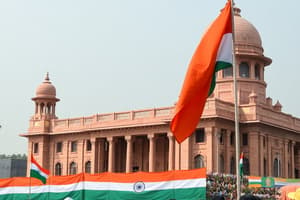Podcast
Questions and Answers
Discuss the constitutional provisions related to the freedom of press in India and explain how it is safeguarded under article 19(1)(a) of the Indian Constitution.
Discuss the constitutional provisions related to the freedom of press in India and explain how it is safeguarded under article 19(1)(a) of the Indian Constitution.
The freedom of press in India is safeguarded under article 19(1)(a) of the Indian Constitution, which guarantees the freedom of speech and expression. This provision allows the press to function as a watchdog, ensuring transparency and accountability in the government and society. The freedom of press is further supported by the Supreme Court's interpretation in landmark cases such as Romesh Thappar v. State of Madras and Bennett Coleman & Co. v. Union of India.
Explain the significance of freedom of press under article 19(1)(a) of the Indian Constitution and provide relevant case laws to support your answer.
Explain the significance of freedom of press under article 19(1)(a) of the Indian Constitution and provide relevant case laws to support your answer.
The freedom of press under article 19(1)(a) of the Indian Constitution is significant as it guarantees the right to freedom of speech and expression to the press. This includes the right to gather and disseminate information without censorship or restraint. Relevant case laws include Brij Bhushan v. State of Delhi, Sakal Papers v. Union of India, and Indian Express Newspapers v. Union of India.
How has the Indian judiciary interpreted and upheld the freedom of press under article 19(1)(a) of the Indian Constitution? Provide examples of relevant case laws to support your answer.
How has the Indian judiciary interpreted and upheld the freedom of press under article 19(1)(a) of the Indian Constitution? Provide examples of relevant case laws to support your answer.
The Indian judiciary has interpreted and upheld the freedom of press under article 19(1)(a) of the Indian Constitution by recognizing it as an essential component of the right to freedom of speech and expression. The judiciary has consistently protected the press from undue restrictions and censorship, as seen in cases such as Indian Express Newspapers v. Union of India, Sakal Papers v. Union of India, and State of Bihar v. Bihar Press Bill.
Flashcards are hidden until you start studying
Study Notes
Freedom of Press in India
- Freedom of press is a fundamental right in India, protected under Article 19(1)(a) of the Indian Constitution.
- Article 19(1)(a) states that "all citizens shall have the right to freedom of speech and expression" which includes the freedom of press.
Significance of Freedom of Press
- Freedom of press is essential for the functioning of a democratic society, as it allows for the dissemination of information and opinions to the public.
- It enables citizens to make informed decisions and participate in the democratic process.
- A free press acts as a watchdog over the government, ensuring accountability and transparency.
Safeguarding Freedom of Press
- Article 19(1)(a) safeguards the freedom of press by protecting the right to freedom of speech and expression.
- However, this right is not absolute and is subject to reasonable restrictions under Article 19(2) of the Indian Constitution.
- The restrictions include defamation, contempt of court, and incitement to an offense.
Judicial Interpretation and Upholding of Freedom of Press
- The Indian judiciary has interpreted and upheld the freedom of press in various cases.
- In the case of Romesh Thappar v. State of Madras (1950), the Supreme Court held that the freedom of press is an essential aspect of the freedom of speech and expression.
- In the case of Brij Bhushan v. State of Delhi (1950), the Supreme Court ruled that the freedom of press includes the right to publish and disseminate news and opinions.
- In the case of Sakal Papers v. Union of India (1962), the Supreme Court held that the freedom of press includes the right to publish newspapers and periodicals.
- In the case of Indian Express Newspaper v. Union of India (1986), the Supreme Court ruled that the freedom of press includes the right to access to government information and documents.
Key Case Laws
- Romesh Thappar v. State of Madras (1950)
- Brij Bhushan v. State of Delhi (1950)
- Sakal Papers v. Union of India (1962)
- Indian Express Newspaper v. Union of India (1986)
Studying That Suits You
Use AI to generate personalized quizzes and flashcards to suit your learning preferences.



